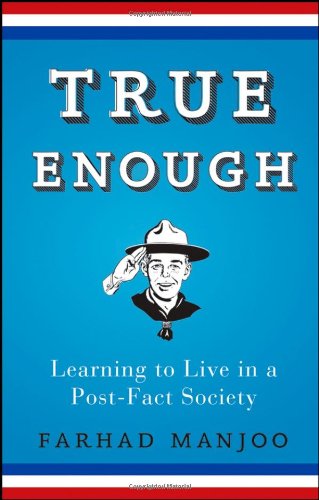True Enough Summary
6 min read ⌚

Learning to Live in a Post-Fact Society
Even if you don’t know who Kellyanne Conway is (now you’re one click away from finding out), you’ve probably heard the most famous phrase she has coined: “alternative facts.”
We all laughed! Twitter had a ball with it! And newspapers promptly described the phrase as Orwellian, leading up to an almost 10,000% sales increase of Orwell’s dystopian book, “1984”!
But, this is where it got ugly:
Some were right to point out that newspapers shouldn’t get a say in the matter! It was their fault all along – they’ve fed us with fake news for years now!
Farhad Manjoo is in the business long enough to know these things. “True Enough” is his attempt to separate the facts from the fiction.
The conventional facts.
Who Should Read “True Enough”? And Why?
There are few things more important nowadays than learning to tell what is wrong from what is right. Because you can’t take even books concerned with your health at their word. It’s all marketing: if you advertise a lie as truth, it’s bound to become a fact after a while. (Remember that scene: this is the West, sir…)
Fortunately, we don’t need to falsely advertise “True Enough.” It’s a book that’s bound to be tempting for anyone. Media students and sociologists should especially have a go.
About Farhad Manjoo
 Farhad Manjoo is an American journalist. He was born in South Africa, but his family moved to Southern California when he was eight years old. A Cornell graduate, he got a job as a “Slate” staff writer in 2008.
Farhad Manjoo is an American journalist. He was born in South Africa, but his family moved to Southern California when he was eight years old. A Cornell graduate, he got a job as a “Slate” staff writer in 2008.
Five years later, he joined “The Wall Street Journal,” and in 2014 he became the “State of the Art” columnist for “The New York Times.”
“True Enough” is his first and, so far, the only book.
True Enough Summary
Here’s an interesting fact:
Before the digital revolution, when media was “one TV and few radio channels,” people faced fewer problems discerning the truth. Nowadays, in the age of the internet, hardly anyone knows what is true and what is false.
True?
Truish. And that’s the problem: we’re just guessing! We’re not really sure if we told you the right thing. It’s not like we read a study before writing the previous paragraph!
However, we suppose Farhad Manjoo has, and we’ll believe him for now. His idea is that, nowadays, when everyone can share his opinion on the internet, the truth is more fragmented and more easily manipulated.
And he has an example:
During the 2004 American elections, the Swift Boat Veterans, a right-wing group supporting George W. Bush, started a rumor that the opposing candidate, John Kerry, was, in fact, a bad Navy officer and a traitor. They claimed that he hadn’t won his medals through feats of honor, even though there were countless witnesses who begged to differ.
In the end, the Swift Boat Veterans were just too relentless: their rumor had a direct effect on the final results. John Kerry lost by a margin of only 2% – and probably would have won in the absence of the rumor.
So, what was the problem?
Simply put, the problem is us. We seem to hear and see what we want to hear. We have a mental map of the world which is distorted and which we are unwilling to expand and correct. It’s like we’re living in two different worlds, in spite of objective reality.
A good example is a psychological study of a 1951 football game between Princeton and Dartmouth. As expected, the study revealed that the video of the game made no difference: the opposing fans interpreted the footage in accordance with their preconceived opinions.
Dartmouth fans thought Princeton disobeyed the rules. Princeton fans were confident that Dartmouth played dirty.
And it gets worse!
If we like something more than our prejudices, it’s to find information which proves them. This is called “selective exposure,” and it is as bad as it sounds. Essentially, it means that we prefer to only listen to things which we believe are true beforehand.
So, even if three out of four sentences contradict our preconceptions, we’ll tend to remember the one which doesn’t.
Could it get any worse?
Yes – if you’re a Republican! At least few studies have shown that you’re more likely to be biased. So much so, in fact, that if you’re reading this sentence, you’re bound to dismiss it as propaganda. Even though you can open “True Enough” right about now and search the studies yourself!
But, that might not be enough as well!
Because this is not a high feedback topic there’s a definite truth about. And sociologists and psychologists have noticed that low feedback topics – global warming, health, the necessity of war, abortion – are the ones which cause misunderstandings.
Newspapers can’t lie about the winner of a game. But, they can about whether the taxes should be higher or lower. There are too many factors and too many differing opinions for anyone to know the actual truth.
And that’s the right stimulus for all those Dr. Foxes around!
Don’t worry you don’t know him: he doesn’t exist! Dr. Fox was, in fact, a fictive name for a television actor who was introduced by a researcher named John Ware as an expert at a conference. He charismatically delivered a non-sensical speech on a subject nobody in the audience was familiar with.
The results?
People deemed him the best speaker at the conference!
John Ware was probably laughing somewhere in the audience. Five decades later we see nothing funny about the fact that, in the eyes of the multitude, flash trumps truth 9 out of 10 times.
Now, was that pun intended?
Key Lessons from “True Enough”
1. The World Is Too Democratic for Truth
2. Beware of All Those Dr. Foxes Out There
3. Doubt Everybody (But Still Find Some Motivation to Trust People)
The World Is Too Democratic for Truth
It may sound a bit paradoxical – but, it’s true! It’s just too cheap to open a blog or even produce a movie nowadays. And not everyone’s opinion has the same weight!
However, if you believe 9/11 was a conspiracy, who are you going to believe: conspiracy websites, or experts who laugh off your beliefs?
Beware of All Those Dr. Foxes Out There
The way one says something may have more effect on us than the actual content. And the media knows this and misuses it daily.
And your duty?
Well, next time a charismatic man or a foxy lady starts talking about some difficult topic – just close your eyes!
Doubt Everybody (But Still Find Some Motivation to Trust People)
Because you can’t trust anyone! There are just too many PR campaigns to be sure that your truth isn’t sponsored by somebody.
The problem is, societies are based on trust. So, paradoxically, you’ll have to trust someone. Start with your close ones.
Like this summary? We’d Like to invite you to download our free 12 min app, for more amazing summaries and audiobooks.
“True Enough” Quotes
“True Enough” chronicles a society’s splintering. Share on X The creeping partisanship has begun to distort our very perceptions about what is “real” and what isn’t. Indeed, you can go so far as to say we’re now fighting over competing versions of reality. Share on X Selective exposure… says, simply, that in an effort to avoid the cognitive dissonance that comes out of receiving news that challenges our beliefs, we cunningly select the messages we consume. Share on X Selective perception says that even when two people of opposing ideologies overcome their tendency toward selective exposure and choose to watch the same thing, they may still end up being pushed apart from each other. Share on X Choosing means trusting some people and distrusting the rest. Choose wisely. Share on XOur Critical Review
“True Enough” is not a book which offers solutions. It is a book which provides analysis of a problem. Might we add, an in-depth analysis of a serious problem? That being said, it might be a tad overbearing for anyone who is not an American.
That’s because it’s mostly concerned with the United States, and especially the biases among Republicans and the effects these have on the elections process.
So, if you are a Democrat living in the United States, you’ll probably love this book and deem it eye-opening. If, however, you’re a Republican, you might consider it biased. Which brings us back to the original problem the book is dealing with.
And the question remains: didn’t we know this all already?
Emir is the Head of Marketing at 12min. In his spare time, he loves to meditate and play soccer.







